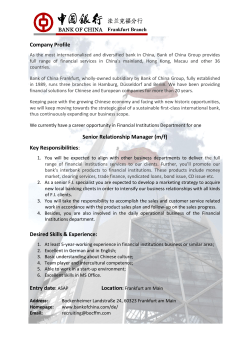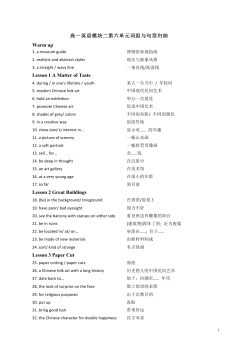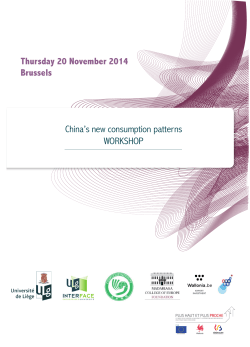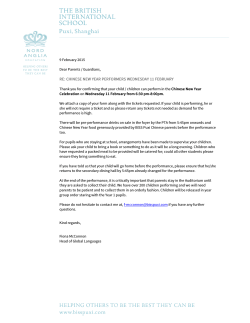
Introduction-of-K-12.. - The Chinese Language Teachers
K-12 CHINESE LANGUAGE TEACHING The Chinese Language Teachers Association, USA The Journal Initiated by the Chinese Language Teachers Association, USA (CLTA-USA), the inaugural edition of the web-based journal K-12 Chinese Language Teaching will be officially published on the CLTA –USA website on September 1, 2015. This new publication aims to serve preschool and K-12 Chinese language (as a second language) education worldwide by linking preschool and K-12 Chinese language teachers, Chinese language teacher educators, Chinese language pedagogy researchers, Chinese language program leaders and policymakers. The CLTA –USA platform will focus on sharing experiences and exchanging ideas in teaching, research, and professional development. Editor: Prof. Annie Ping Zeng Department of Languages University of Alaska Anchorage 3211 Providence Drive, Anchorage AK 99504 Phone: (907) 786-4312 Fax: (907) 786-4190 Email: zengp2006@gmail.com Editorial Board: He, Wayne Wenchao,University of Rhode Island Liu, Meiru, Portland State University Tan, Dali, Northern Virginia Community College Zhang, Zheng-Sheng, San Diego State University Features Integration of theory and practice on acquisition of preschool and K -12 Chinese language as a second language Open resource for professional development Online interaction and communication Submissions must be original and have not been published or under consideration for publication elsewhere while being reviewed for this Journal. Check the grammar and spelling of the manuscript carefully. Authors who do not use their native languages are advised to have their manu- Submission Requirements script proofread by native speakers before submitting their manuscripts. Manuscripts can only be submitted as electronic versions. Manuscripts should be submitted to the provided email address. Call for Papers Submissions and contributions are welcome on, but not limited to, the following themes: Theories and case analysis of pedagogies of preschool and K-12 Chinese language as a second language (four skills and teaching of culture) for traditional Chinese preschool and K-12 programs and special programs (STARTALK, Heritage, and Immersion), as well as action research, Chinese language curriculum design and planning, classroom management theories and practice, and assessment theories and practice Application of teaching materials and technology in teaching preschool and K-12 Chinese language as a second language Study abroad and cross-cultural experience in Chinese language learning Theories and practices on teacher education of Chinese language as a second language, Chinese language teacher certification programs in particular in terms of pedagogies and curriculum design for types of preschool and K-12 Chinese programs, classroom management, assessment, and social and emotional development Cross-cultural adaptations and in-service or pre-service teachers’ professional development Best practices of preschool and K-12 Chinese programs including policies and operation Introduction of Chinese teacher certification programs Reviews of Chinese textbooks and reading materials Column Description Column I: Research on preschool and K-12 Chinese Language Teaching K-12 CLTDJ welcomes manuscripts on preschool and K-12 Chinese language (as a second language) teaching and Chinese language teacher education in terms of pedagogy, curriculum design, classroom management, assessment, as well as social and emotional development. Also welcome are research papers on topics such as: teaching culture, cross-cultural learning in study abroad programs, and teaching research. Word limit: up to 3000 English words or 5000 Chinese characters Column II: Teaching Practices and Tips This column is dedicated to preschool and K-12 school practitioners, novices or veterans, to share their valuable experience proved to be meaningful for students’ learning in terms of pedagogy, curriculum design, classroom management, assessment, teaching culture, cross-cultural teaching, study abroad program, and action research. Word limit: 800-2000 English words or 1200-3000 Chinese characters Column III: Book Reviews and Applications In the situation that the textbooks for preschool and K-12 Chinese programs are not sufficient and need to be more appropriate, experiment and evaluation on textbooks and reference books play a significant role to facilitate teaching. Submissions to this column will be helpful for preschool and K-12 Chinese program curriculum and pedagogical innovation. Word limit: 800-2000 English words or 1200-3000 Chinese characters Column IV: K-12 Chinese Programs This column invites introductions and evaluations about types of preschool and K-12 Chinese programs from the regional or national perspectives and in terms of educational policies, program features, practices, and significant outcomes for future improvement or application. Word limit: 800-2000 English words or 1200-3000 Chinese characters Manuscript Review All submitted manuscripts are subject to blind review and text editing by professionals in the field of preschool and K-12 Chinese language acquisition and teaching. Submission and Contact: English Format: Publication Manual of the American Psychological Association (6th ed.) Submitted to: Chinese Format: k12journal@gmail.com K-12 CLT Format as Attached Deadline for the Inaugural Edition: May 31st, 2015 Advisory Board Editor’s Phone: (907) 786-4312 Chu, Chengzhi, University of California, Davis Claire Kotenbeutel, Wisconsin World Languages Inde- Editor’s Email: k12journal@gmail.com pendent Consultant and STARTALK Team Leader Lin, Yu-Lan, Executive Director of CLASS Senior Program Director of the World Languages Program of the Boston Public Schools Journal Webpage: Under construction McGinnis, Scott G, Defense Language Institute, Monterey Shen, Heling, University of Iowa Tao, Hongyin, University of California, Los Angeles Tseng, Miao-Fen, University of Virginia Wang, Shuhan, President, Excellence in Language Education Consulting International Copyright by CLTA Wu, Wei-ling, Chinese Language Education Consultant Xie, Jiaxin, San Francisco State University
© Copyright 2025









